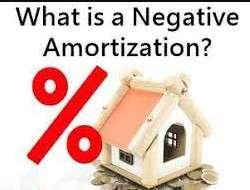Negative amortization means that whenever you pay off a loan, the amount you owe will still go up because you are not paying enough to cover the interest.
Amortization means paying off a loan with regular payments, so that the amount you owe goes down with each payment.
Negative amortization is commonly associated with certain types of loans, such as adjustable-rate mortgages (ARMs) or payment-option adjustable-rate mortgages (option ARMs).
These loans often offer a low initial interest rate or flexible payment options, which can be attractive to borrowers. However, they also come with the risk of negative amortization.
Your lender may offer you the choice to make a minimum payment that doesn’t cover the interest you owe.
The unpaid interest gets added to the amount you borrowed, and the amount you owe increases.
Usually, after a period of time, you will have to start making payments to cover principal and interest. These payments will definitely be higher.
A negative amortization loan can be risky because you can end up owing more on your mortgage than your home is worth.
That makes it harder to sell your house because the sales price will not be enough to pay what you owe. This can put you at risk of foreclosure if you run into trouble making your mortgage payments.
Avoid Paying Interest on Interest.
Some loans have payment options that let you pay only a portion of the amount of interest you owe each month. If you pay only part of the interest, the amount that you do not pay will add up and increase principal balance.
Then you will have to pay more and not only interest on the money you borrowed, but interest on the interest on the original loan amount. This dramatically increases the amount of debt you have and the cost of the loan.
To keep your debt from growing, try to pay down all of the interest and at least some of the principal you owe.
How Does Negative Amortization Affect my Credit Score?
There are quite a number of ways negative amortization can affect your credit score.
Although this is dependent on certain factors like, credit scoring model, overall credit profile. I will explain a few others below:
Payment History
Your previous payments history is a significant factor in determining your credit score. Therefore, if you make minimum payments during the negative amortization period or fail to cover the full amount of interest, it is late or incomplete payment. This can have a negative impact on your credit score, as missed or late payments are reported to credit bureaus.
Credit Utilization
Negative amortization leads to an increase in your loan balance. This in turn affects your credit utilization ratio. Credit utilization measures the amount of credit you use and compares it to total available credit.
If your loan balance increases due to negative amortization, it can result in a higher credit utilization ratio, which will affect your credit score badly. High credit utilization is a risk factor by lenders and can lower your credit score drastically.
Loan Balance
The increasing loan balance that occurs as a result from negative amortization can contribute to a higher total debt profile.
Lenders and credit scoring models take this into consideration, the amount of debt you have when assessing your creditworthiness. Having a large amount of debt relative to your income or available credit can potentially lower your credit score.
Conclusion
Significantly, negative amortization stands as a great risk and a challenge for borrowers. As a borrower, allowing loan balances to increase over time, may lead to financial instability and burden you with larger debts than normal.
It is however, important for you, to fully understand the terms and potential consequences before you enter into a loan agreement with negative amortization.
Furthermore, a good financial literacy level and careful evaluation of options is essential to make proper decisions and protect yourself from the sour tales of negative amortization.
As a potential borrower, it is essential to seek professional advice and consider alternative loan structures that prioritize long-term financial well-being. Vigilance and knowledge are key to ensuring a secure and stable financial future.
More Helpful Guides
- U.S. Bank Mortgage: Mortgage Types, It’s Term’s and how it Works
- What Type of Interests are Calculated on Home Mortgages
- Adjustable Rates Mortgage (ARM): What is Adjustable Mortgage Rates?
- What is Annual Percentage Rate (APR) Mortgage?







